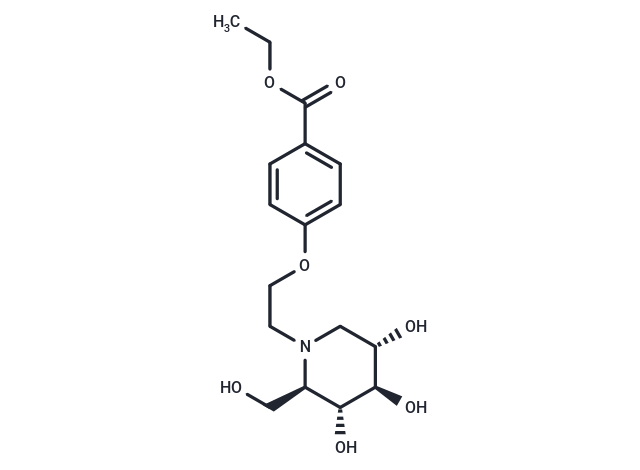Shopping Cart
- Remove All
 Your shopping cart is currently empty
Your shopping cart is currently empty

Emiglitate is a selective and competitive α-glucoside hydrolase inhibitor.

| Pack Size | Price | Availability | Quantity |
|---|---|---|---|
| 25 mg | $1,520 | 6-8 weeks | |
| 50 mg | $1,980 | 6-8 weeks | |
| 100 mg | $2,500 | 6-8 weeks |
| Description | Emiglitate is a selective and competitive α-glucoside hydrolase inhibitor. |
| In vitro | Emiglitate inhibits the glucose-stimulated insulin release in parallel. It also has an inhibitory effect on the activities of acid glucan-1,4-α-glucosidase and acid α-glucosidase. The CO-induced amplification of the glucose-stimulated insulin release as well as of the increased activities of the acid α-glucoside hydrolases are abrogated by emiglitate. Which showed the same levels as in the absence of CO. The CO-induced rise in the activities of acid phosphatase and acid N-acetyl-β-D-glucosaminidase is not appreciably affected by emiglitate. The activities of acid phosphatase and N-acetyl-β-D-glucosaminidase tend to increase in the presence of the α-glucoside hydrolase inhibitor [1]. |
| In vivo | Emiglitate in the amount of 5 mg/kg b.wt. does not induce significant changes either of glycogen concentrations or at the EM-level. Emiglitate causes a significant, dose-dependent increase of hepatic glycogen concentrations, in fasted rats. The increase in hepatic glycogen is due to lysosomal storage of glycogen only [2]. |
| Alias | BAY o 1248 |
| Molecular Weight | 355.38 |
| Formula | C17H25NO7 |
| Cas No. | 80879-63-6 |
| Relative Density. | 1.31g/cm3 |
| Storage | Powder: -20°C for 3 years | In solvent: -80°C for 1 year | Shipping with blue ice. |

Copyright © 2015-2024 TargetMol Chemicals Inc. All Rights Reserved.